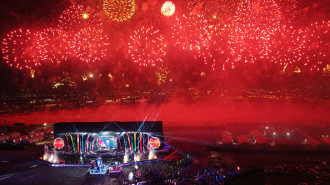Algerian president sets election date as protesters flood streets
The elections were scheduled to be held in 2022, but Tebboune in February dissolved parliament and called for polls to be held before the end of the year as part of reforms.
Algeria, Africa's fourth-largest economy, saw oil revenues collapse in 2020, with the International Monetary Fund predicting a 5.2 percent recession as the country also struggles with the Covid-19 pandemic.
As part of the reforms, Tebboune also released dozens of pro-democracy activists of the "Hirak" protest movement, which had forced his predecessor Abdelaziz Bouteflika to resign in 2019.
The upcoming election of the lower house of the national assembly would be held on the basis of a new electoral law, which Tebboune also ratified on Thursday, a statement from his office said.
Last month Tebboune pledged that the election would be free of corruption, and would "open the doors of parliament to young people", adding that they "must have political weight”.
Tebboune signed the country's new constitution into law in January after it was approved in a November referendum, also on record low turnout.
The new constitution was pitched as responding to the demands of the Hirak, but keeps in place Algeria's presidential regime and expands the powers of the army, a central pillar of the state.
Twitter Post
|
His remarks last month came on the eve of the second anniversary since the Hirak protests began.
The protests have seen as revival with renewed rallies across the country, after a halt early last year amid coronavirus restrictions.
Demonstrators are demanding a sweeping overhaul of the ruling system in place since Algeria's independence from France in 1962, and an end to the military's domination of the North African country.
Tebboune, once a premier under Bouteflika, was elected on record low turnout in a December 2019 poll boycotted by the Hirak.
He has reached out to the protest movement while also seeking to neutralise it.
Earlier this month, the United Nations's rights office said it was "very concerned about the deteriorating human rights situation in Algeria and the continued and increasing crackdown on members of the pro-democracy Hirak movement".
The office had "reliable information" indicating that hundreds of people had been detained since street protests resumed on February 13, after months of being forced online because of the pandemic, spokesman Rupert Colville said.
Colville warned that the latest developments echoed the reaction to the demonstrations in 2019 and 2020, when at least 2,500 people were detained.
He said the rights office had received credible reports that some 1,000 people had been prosecuted for participating in the Hirak movement or for social media posts critical of the government.
Read also: The unfinished gender equality revolution of the Arab Spring
"We have also received allegations of torture and ill-treatment in detention, including sexual violence," he said.
The UN urged authorities in Algeria to free all those arbitrarily detained, stop using violence against peaceful protesters and cease arbitrary arrests, he added.
In January, Tebboune signed the country's new constitution into law after it was approved in a November referendum, also on record low turnout.
The new constitution was pitched as responding to the demands of the Hirak, but keeps in place Algeria's presidential regime and expands the powers of the army, a central pillar of the state.
Agencies contributed to this report.
Follow us on Facebook, Twitter and Instagram to stay connected







 Follow the Middle East's top stories in English at The New Arab on Google News
Follow the Middle East's top stories in English at The New Arab on Google News


